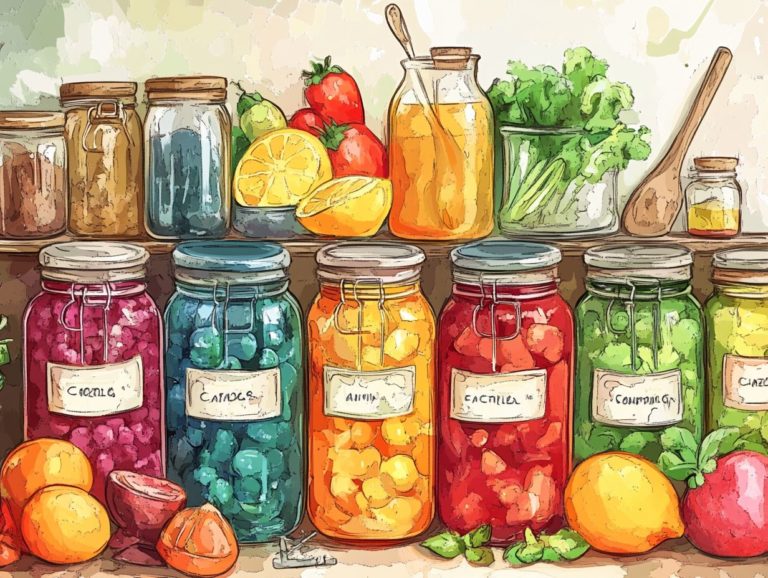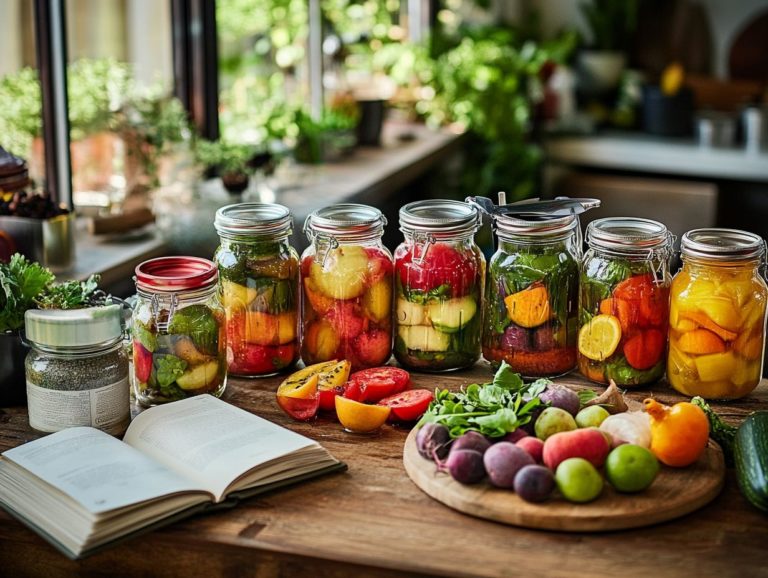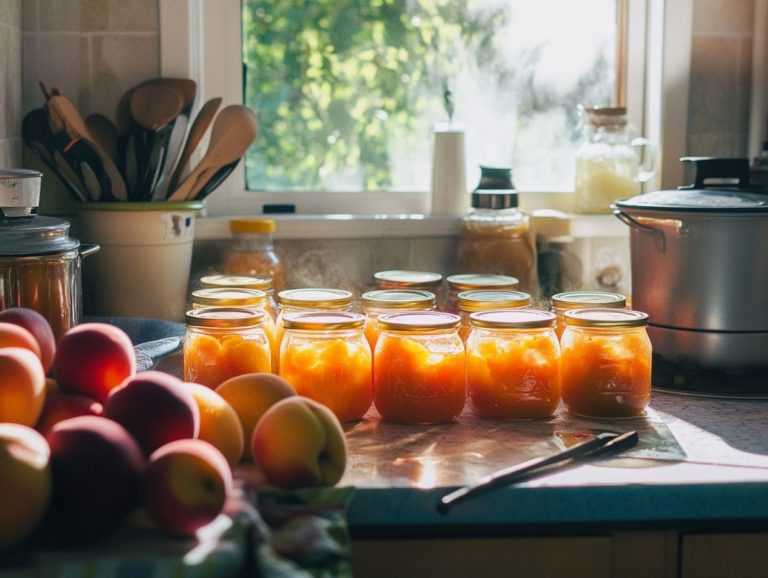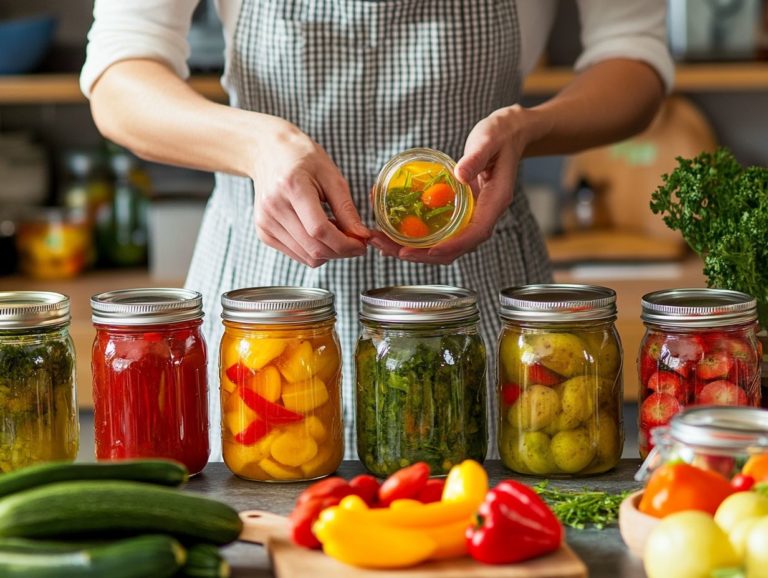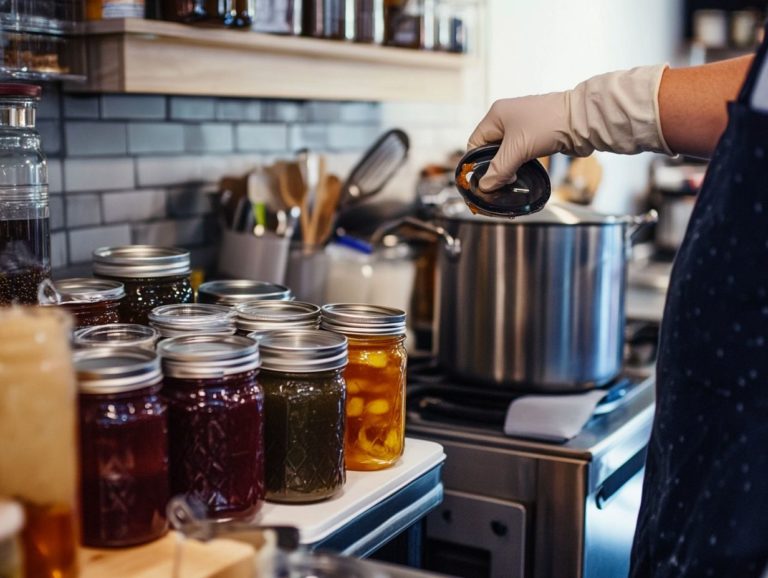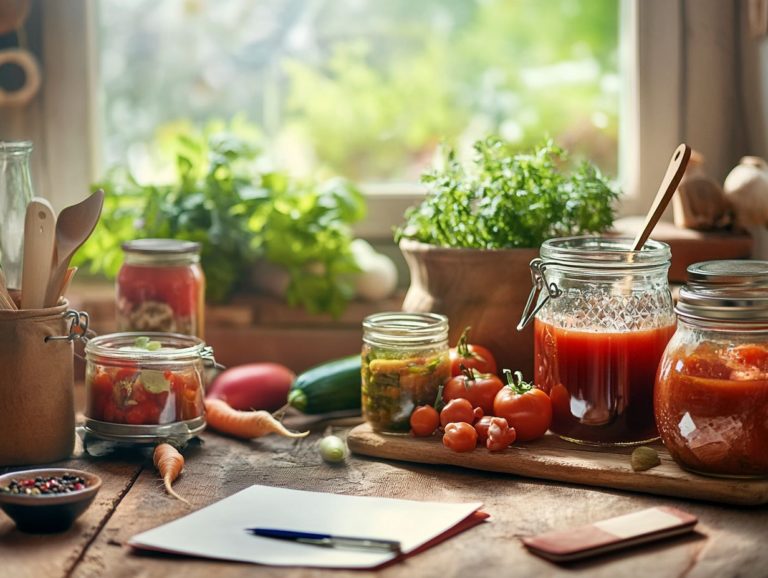Can I Canning Fruit Juices?
Canning fruit juices is a cherished tradition. It helps preserve the vibrant flavors and nutrients of seasonal fruits, including delightful options like apple juice, blackberry cordial, and cranberry juice. Get ready! This guide will show you how to can like a pro.
You ll find a comprehensive step-by-step guide to help you get started. Essential safety considerations will ensure your canned juices remain both safe and delectable.
For those seeking variety, alternative preservation methods, such as freezing and refrigerating, will also be explored. Embrace this journey and discover how you can savor fresh fruit juices throughout the year!
Contents
Key Takeaways:
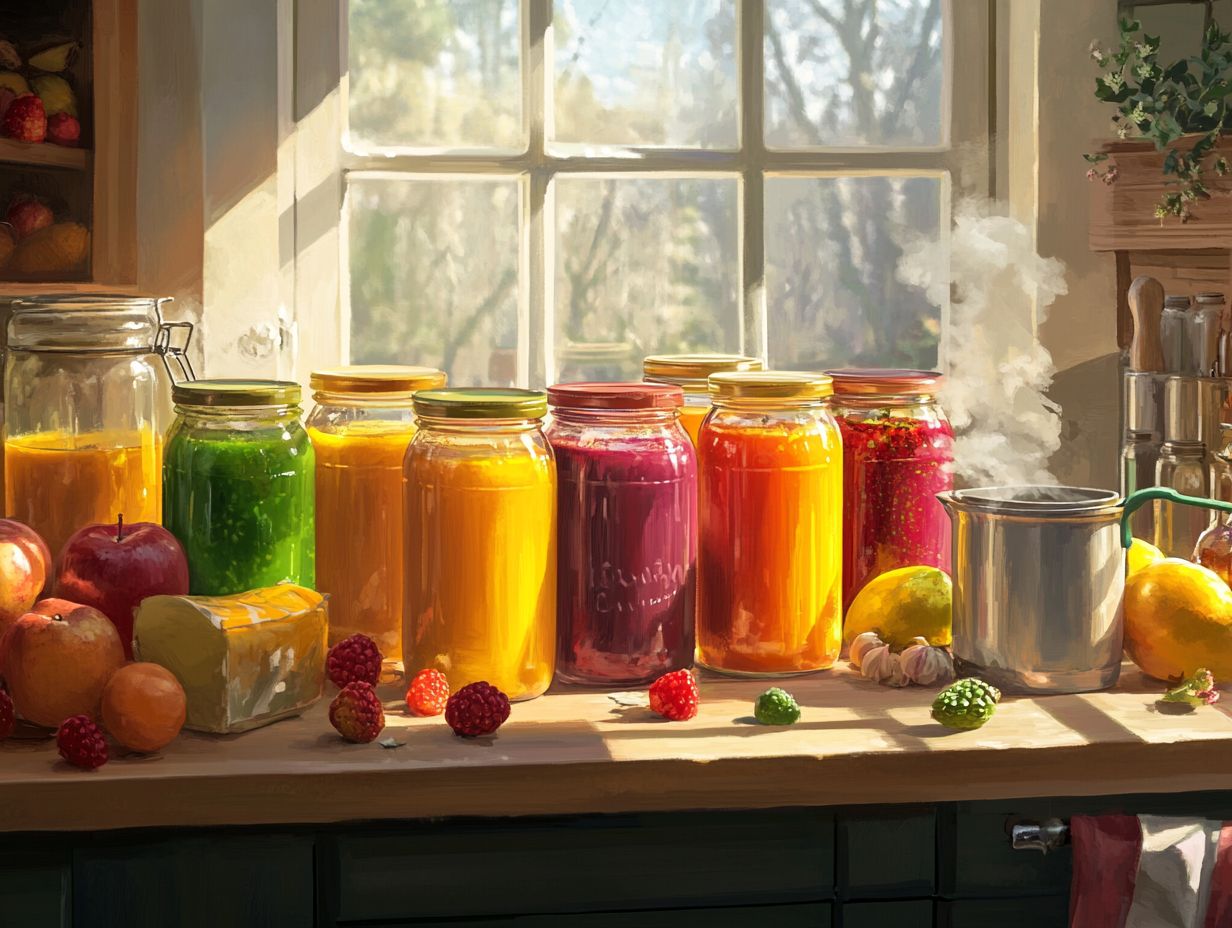
- Canning fruit juices is a safe and effective way to preserve them.
- Canned juices can last for up to a year.
- Proper hygiene is crucial when canning to avoid contamination.
Understanding Canning Fruit Juices
Understanding how to can fruit juices is essential for anyone eager to preserve the nutritional benefits of seasonal fruits, such as apple juice, blackberry cordial, and cranberry juice. This time-honored practice not only lets you savor the taste of fresh fruit throughout the year but also provides a practical approach to managing your summer harvest effectively.
By mastering the art of preserving juices, you can turn perfectly ripe fruit into delightful canned juices like apricot nectar, peach nectar, grape juice, pineapple juice, and even tomato juice. This ensures their peak quality and flavor remain intact. Using a fruit press can also enhance your juice extraction.
What is Canning?
Canning is a way to keep food fresh by sealing it in airtight containers. This process helps to keep spoilage at bay and extends shelf life, especially for fruit juices. It protects the quality and nutrition of your produce and allows you to savor seasonal flavors all year round, turning fresh citrus like lemons and oranges into delightful beverages.
The science behind canning hinges on removing air from the jars to create a vacuum seal. This effectively stifles the growth of bacteria, yeast, and molds that spoil food. To kick off the canning process, you ll want to prepare clean jars. Make sure they re sterilized to uphold hygiene standards.
Using boiling water plays a crucial role here. It heats the jars and creates a safe environment for canning. A fruit press can significantly boost the efficiency of juice extraction. By grasping each step of the process, including careful monitoring of simmering temperature, you ll find that preserving fruits transforms into a rewarding and enjoyable endeavor.
Benefits of Canning Fruit Juices
Canning fruit juices presents a wealth of advantages. These include the preservation of nutritional value and the extension of shelf life for delightful beverages like berry juice and lemonade or orange. If you’re wondering, can I use frozen fruits for canning? Enjoy these flavors long after the summer harvest has concluded.
Start canning today to enjoy delicious fruit juices all year long!
Nutritional Value and Shelf Life
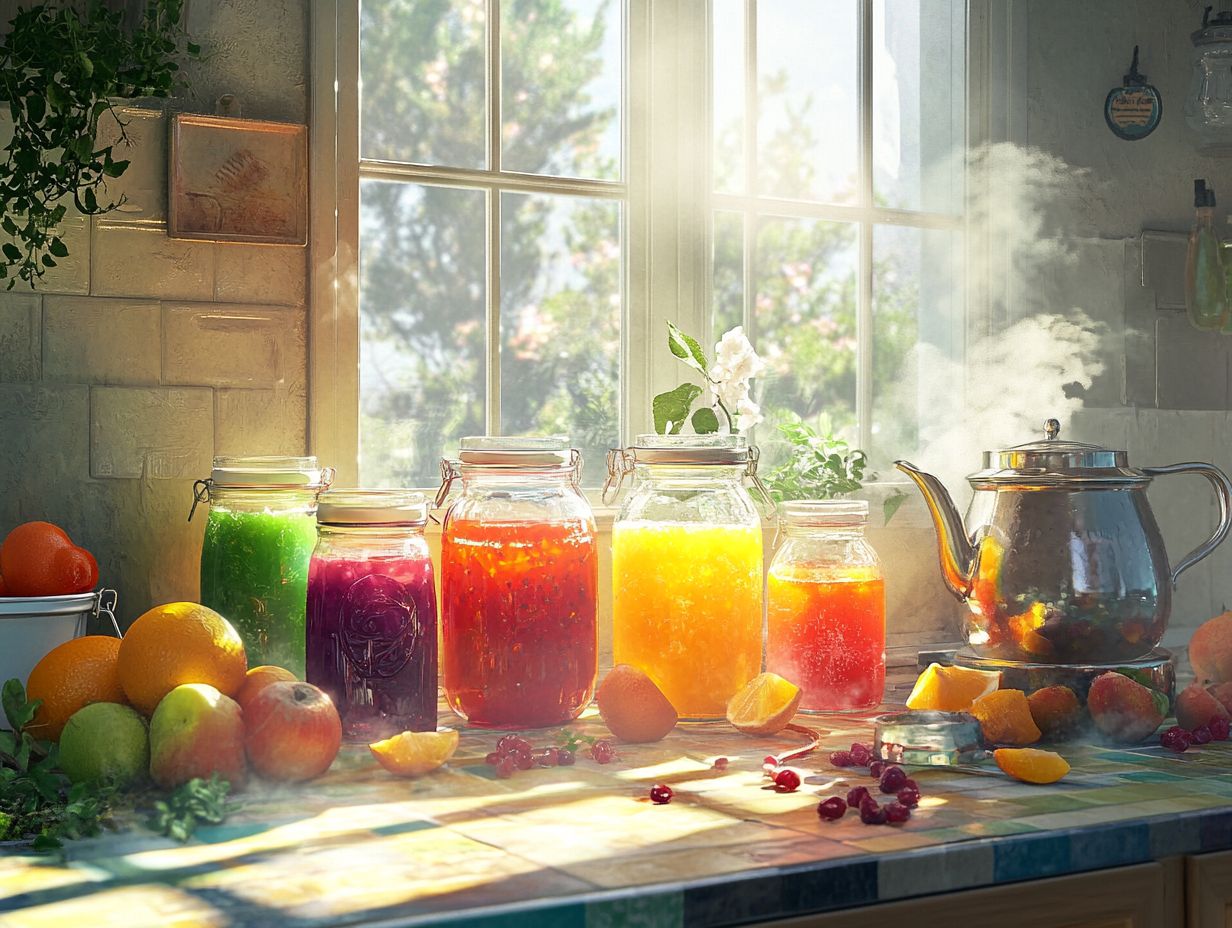
The nutritional value and shelf life of canned fruit juices are critical for home canners. Well-preserved juices retain essential vitamins and minerals, offering you health benefits.
By using the right canning methods, you can enhance the longevity and health benefits of your fruit juices. Proper sterilization and airtight sealing keep harmful bacteria away, keeping your juices fresh for months or years.
Adding sugar acts as a natural preservative and balances flavors. Finding the right amount helps maintain nutrient integrity while extending shelf life.
With a thoughtful approach, enjoy delicious, nutritious juices like blackberry juice that enrich your diet.
How to Can Fruit Juices
Master the art of canning fruit juices with a careful plan. From selecting ripe fruits to extracting juice, every step must follow safe canning practices, including understanding can I canning homemade salsa? techniques.
Each phase of the process is crucial for ensuring flavor and safety.
Step-by-Step Guide
This guide walks you through the essential processes of canning fruit juices. It includes tips on using a juice-making machine to preserve your favorite flavors.
Whether you re a seasoned canner or new to it, grasping these basics can greatly impact your results. Start by gathering your equipment: a large pot, canning jars, lids, and a jar lifter.
Your journey begins with washing your fruits. Then, extract their juice using a juice-making machine or a steam extractor. Keeping your workspace clean is vital; sanitize all tools and containers, including hot jars, to avoid contamination. Remember to check the acidity levels, which affect how sour the juice is.
Safety Considerations for Canning Fruit Juices
Safety is paramount when canning fruit juices. Improper techniques can lead to contamination and spoilage, harming your preserves.
Prioritizing safety protects your creations and ensures quality in every jar.
Preventing Contamination and Spoilage
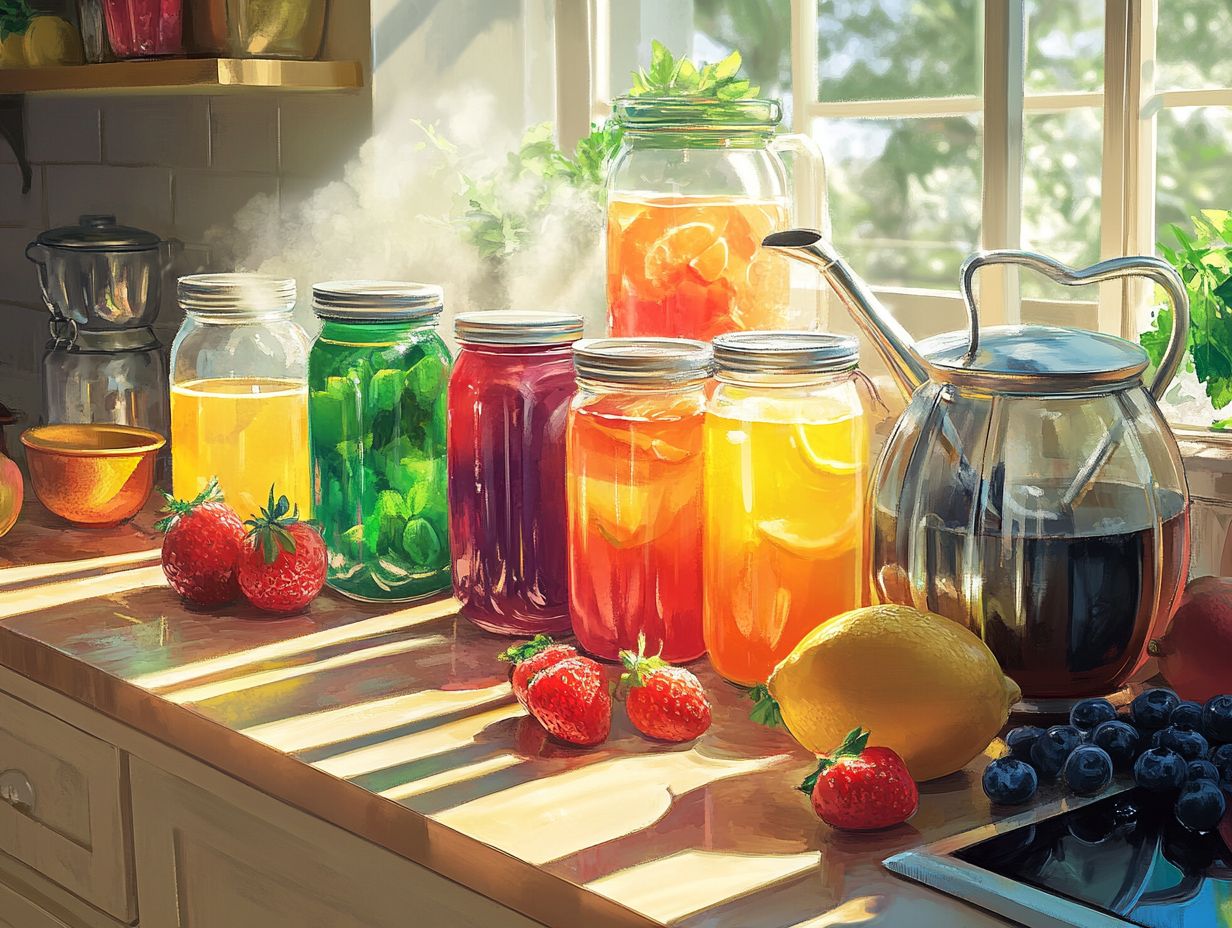
Preventing spoilage demands your attention to food safety practices during canning, including rinsing your jars.
- Start by rinsing your jars in hot, soapy water. Then, sterilize them in boiling water for at least ten minutes. Always use new lids or ensure the ones you have are undamaged for effective sealing.
- Keep an eye on the boiling water during the canning process for safety.
As you can, follow guidelines on time and temperature, and check the simmering point. Regularly monitor your boiling water bath or pressure canner to ensure your juices are processed properly.
Keeping your workspace clean and using sanitized utensils further reduces contamination risks.
Alternatives to Canning Fruit Juices
Exploring alternatives to canning fruit juices unveils a plethora of preservation methods, such as freezing and refrigeration. Each method offers the potential to extend the shelf life of your favorite flavors.
Embracing these options not only enhances your culinary repertoire but also allows you to savor the essence of your fruits long after the harvest. Imagine enjoying the fresh taste of summer fruits all year round!
Other Preservation Methods
Freezing and refrigeration provide distinct advantages for maintaining flavor and extending shelf life. Freezing juice preserves its integrity by halting microbial growth (the growth of microorganisms that can spoil food) and enzymatic activity (the chemical processes that can change the juice’s flavor and quality).
This can significantly extend shelf life often up to several months. On the other hand, refrigeration keeps your juice cool without solidifying it. This offers easy access while retaining that fresh taste. However, refrigeration is more limited, typically allowing for a storage period of about a week or two.
Note that while freezing can alter the texture upon thawing, refrigeration ensures your juice remains ready to drink. Both methods minimize nutrient loss while providing you with the convenience you desire. They stand out as excellent alternatives to canning.
Frequently Asked Questions
Can I can fruit juices at home?
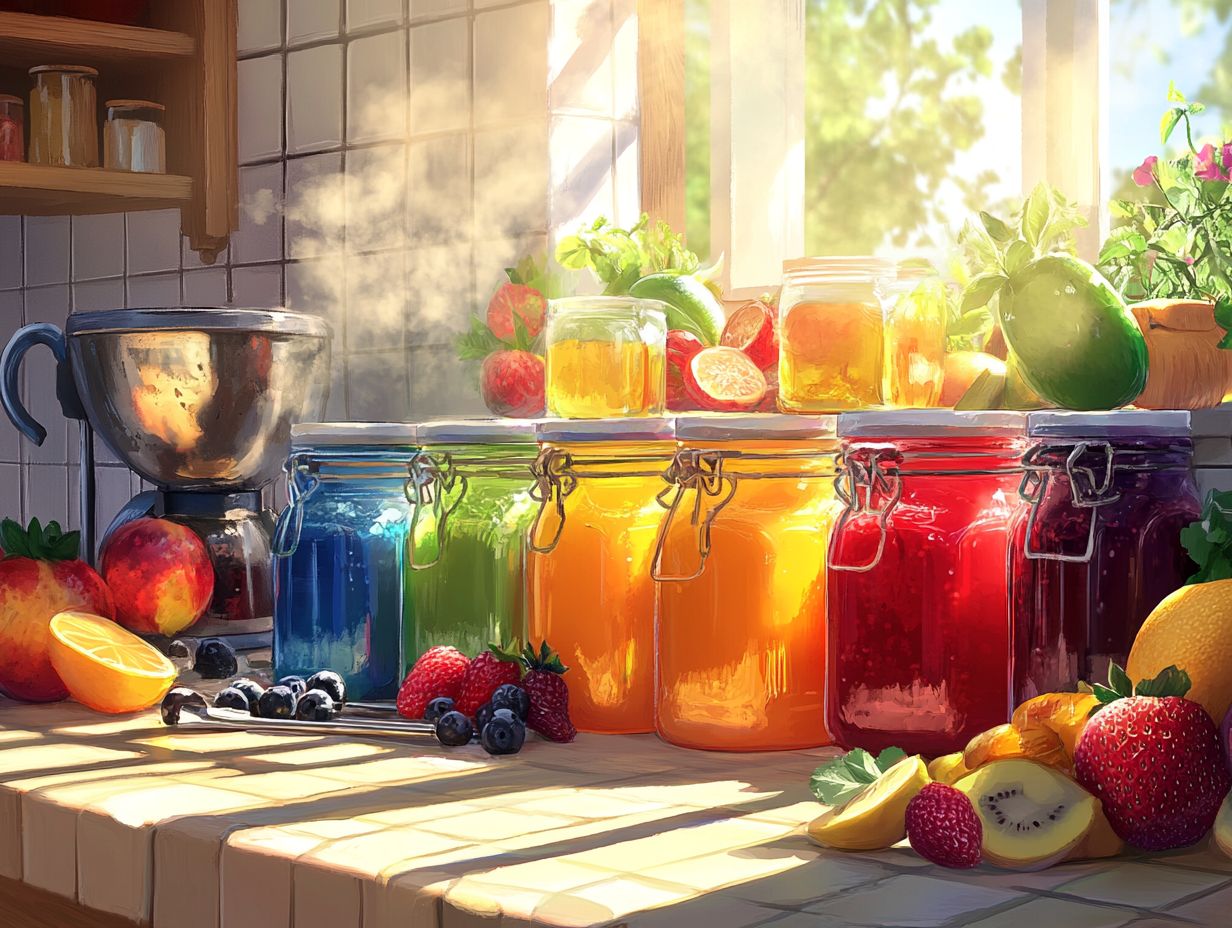
Yes, you can definitely can fruit juices at home! It’s a great way to preserve the fresh flavors of your favorite fruits, like lemonade or orange, and enjoy them all year round.
What equipment do I need for canning fruit juices?
You will need canning jars, such as KERR jars, lids, a canning pot, canning tongs, and a canning funnel. A water bath canner is essential for high-acid juices, while a pressure canner is necessary for low-acid juices.
Which fruits are best for canning as juices?
Fruits that are great for canning as juices include apples, berries, grapes, peaches, and pears. These provide excellent beverages with high acid content, making them safe for water bath canning.
Do I need to add any preservatives to my canned fruit juices?
No, you do not need to add any preservatives to your canned fruit juices. The canning process itself preserves the juices, including the natural sweetness from sugar. Adding preservatives can affect the flavor and quality of the juices.
Can I can fruit juices that have been sweetened?
Yes, you can can whole fruits that have been sweetened with sugar to taste. However, ensure you use proper canning techniques and follow a reliable recipe to guarantee the safety and quality of your canned juices.
How long can I store my canned fruit juices?
Canned fruit juices can be stored for up to 1 year in a cool, dark place. It’s essential to check for any signs of spoilage before consuming the juices. Discard them if there are any signs of mold or changes in color or smell.
Try these methods today and keep the taste of fresh fruits alive all year!

